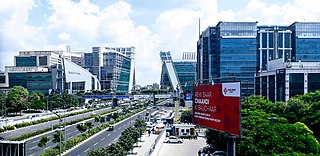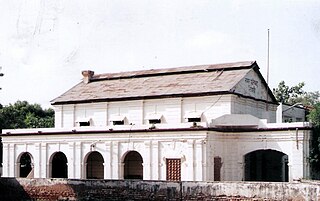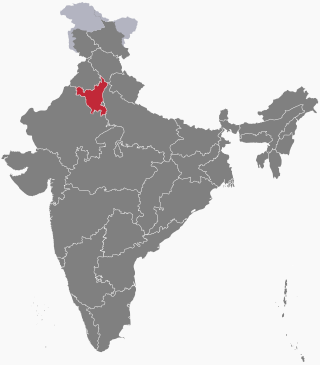
Haryana is an Indian state located in the northern part of the country. It was carved out after the linguistic reorganisation of Punjab on 1 November 1966. It is ranked 21st in terms of area, with less than 1.4% of India's land area. The state capital is Chandigarh, which it shares with the neighbouring state of Punjab; the most populous city is Faridabad, a part of the National Capital Region. The city of Gurgaon is among India's largest financial and technology hubs. Haryana has 6 administrative divisions, 22 districts, 72 sub-divisions, 93 revenue tehsils, 50 sub-tehsils, 140 community development blocks, 154 cities and towns, 7,356 villages, and 6,222 villages panchayats.

Rewari is a city and a municipal council in Rewari district in the Indian state of Haryana. It is district headquarter of Rewari district. It is located in south-west Haryana around 82 km from Delhi and 51 km from Gurgaon. It lies in Ahirwal region.
Jati or JATI may refer to:

The Bagri is a dialect bridge of Rajasthani, Haryanvi & Punjabi and takes its name from the Bagar tract region of Northwestern India in the states of Rajasthan, Punjab and Haryana. The language has a very high (70%) lexical similarity with Haryanvi. Bagri is a typical Indo-Aryan language akin to Haryanvi, Punjabi and Rajasthani with SOV word order. The most striking phonological feature of Bagri is the presence of three lexical tones: high, mid, and low, akin to Rajasthani, Haryanvi, Punjabi.
Rania is a town and a municipal committee in Sirsa district located on the upper bank of Ghaggar River in the Indian state of Haryana. Rania Town is a grain market in Sirsa district. Nearby cities to Rania includes Sirsa and Ellenabad. It shares its RTO office with Ellenabad which is also has its headquarters in Ellenabad. Earlier it was a part of Ellenabad subdivision but later carved out separately as a subdivision in Sirsa district of Haryana. It is at a distance of 22 km each from Sirsa and Ellenabad in opposite direction on Haryana State Highway 32A i.e. Bhambhoor-Jiwan Nagar Road which connects to Haryana State Highway 32 in Jiwan Nagar on one end and Haryana State Highway 23 in Bhambhoor on the other end.

Haryana is a state in India. The state houses several sites from the Indus Valley Civilization, which was a cradle of civilisation. In the Mahabharata, Haryana is mentioned as Bahudanayak Region.

Haryana, formed on 1 November 1966, is a state in North India. For the administrative purpose, Haryana is divided into 6 revenue divisions which are further divided into 22 districts. For Law and Order maintenance, it is divided into 5 Police Ranges and 4 Police Commissionerates.

Ranghar are a community of Muslim Rajputs in the Indian states of Haryana, Punjab, Himachal Pradesh, Delhi and Uttar Pradesh; and in Sindh (Muhajirs) and Punjab in Pakistan.
Ahirwal is a region spanning parts of southern Haryana, north-eastern Rajasthan, and South-Western Delhi The region was once a small principality based from the town of Rewari and controlled by members of the Yaduvanshi Ahir community from around the time when the Mughal empire was in decline.
Sri Gurusar Modia is a village in the Indian state of Rajasthan situated near borders of Rajasthan, Haryana and Punjab states and the international border of India and Pakistan. This village is located in the tehsil Suratgarh of district Sri Ganganagar. Suratgarh, once known as Sodhal was believed to be surrounded by the confluence of Saraswati and Drishyati rivers but now the land is a deserted one lying amidst the expanse of The great Indian Thar desert. Suratgarh is famous for its agriculture, air force and army base stations, largest thermal power plant of Rajasthan and largest radio station of Rajasthan called as "Cotton City Channel". Sri Gurusar Modia came into limelight when a controversial self-proclaimed saint and spiritual leader Gurmeet Ram Rahim Singh was believed to be incarnated there and crowned to the throne of Dera Sacha Sauda at Sirsa in 1990. With setting up of Shah Satnam Schools for both boys and girls, super speciality hospitals etc. this village became nationwide popular
The Pachhada are a Punjabi Muslim pastoral community now settled in Punjab, Pakistan. They are also known as Rath. The community has different tribes, and it is believed that they originally hailed from the Bar Region of western Punjab.

The following outline is provided as an overview of and topical guide to Haryana.

Dangal is a 2016 Indian Hindi-language biographical sports drama film directed by Nitesh Tiwari and produced by Aamir Khan and Kiran Rao under Aamir Khan Productions with Siddharth Roy Kapur under The Walt Disney Company India. The film stars Khan as Mahavir Singh Phogat, a pehlwani amateur wrestler who trains his daughters Geeta Phogat and Babita Kumari to become India's first world-class female wrestlers. Fatima Sana Shaikh and Sanya Malhotra portray the adult versions of the two Phogat sisters, Zaira Wasim and Suhani Bhatnagar their younger versions, Sakshi Tanwar their mother, and Aparshakti Khurana adult version of their cousin, Ritvik Sahore his younger version, all of them except Shaikh, Tanwar and Sahore in their film debuts.

Bagar, also Bagad (बागड़) a term meaning the "dry country", is a region refers in north-western India in north Rajasthan, West Haryana, south west Punjab, India where the Bagri language is spoken and which is inhabited by Bagri people. The region is characterised by sandy tracks and shifting sand dunes which are now irrigated by canals.
Mehar Singh Dahiya (1916-1945) commonly known as Fauji Mehar Singh and Jat Mehar Singh, was a Haryanavi poet. He was born in the Dahiya clan of Jats in the village Barona in the Kharkhoda tahsil, in the district of Sonipat. In addition to Haryana, his ragnis are still popular in Delhi, Western Uttar Pradesh and Rajasthan. According to the records of the Jat Regiment, he was born on 15 February 1916. His father, Nand Ram, was a farmer. Due to the economic conditions of the house, his education ended after Class-III. From Childhood, he was fond of singing ragnis. His father was irritated by his son's propensity of singing ragnis, but he was unable to dissuade him from this pastime. He was married to Prem Kaur. In 1937, Mehar Singh joined the army where he kept singing and recording ragnis. During the Second World War, he and his army colleagues allied with the Azad Hind Fauj. In 1945, he died while fighting for the cause of India's freedom.
Jatki, Jadgali, and other related terms have sometimes been used to refer to one or another of the Indo-Aryan languages spoken in Balochistan and neighbouring parts of Sindh and Punjab.

The Haryanvi people are an Indo-Aryan ethnolinguistic group native to Haryana in northern India. They speak Haryanvi, a language is related to Hindi, and other dialects of Haryanvi such as Ahirwati, Mewati, Deshwali, and Bagri. The term Haryanvi people has been used both in the ethnolinguistic sense and for someone from Haryana.
Rangri is a dialect of the Haryanvi language spoken by Ranghar Rajpoot Muslim Muhajirs in Pakistani Punjab and small areas in Sindh. It is still spoken in Haryana, India, but in Pakistan it is called Rangri because of its close association with Muslims Rajpoot Ranghar communities and also because it is mainly spoken by them. It is spoken primarily in Lahore, Sheikhupura, Bhakkar, Bahawalnagar, Khanpur, Okara, Layyah, Vehari, Sahiwal, Phularwan, and Multan as well as Mirpur Khas and Nawabshah, Naushahro Feroze, Sanghar.











